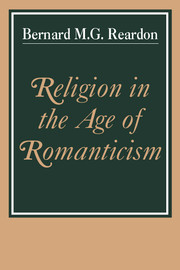Book contents
- Frontmatter
- Contents
- Preface
- 1 Romanticism, idealism and religious belief
- 2 Schleiermacher on the religious consciousness
- 3 Hegel and Christianity
- 4 The idea of God in the philosophy of Schelling
- 5 German Catholic theology in the Romantic era
- 6 Italian ontologism: Gioberti and Rosmini
- 7 Lamennais and Paroles d'un Croyant
- 8 Auguste Comte and the Religion of Humanity
- 9 Ernest Renan and the Religion of Science
- Notes
- Index
2 - Schleiermacher on the religious consciousness
Published online by Cambridge University Press: 05 June 2012
- Frontmatter
- Contents
- Preface
- 1 Romanticism, idealism and religious belief
- 2 Schleiermacher on the religious consciousness
- 3 Hegel and Christianity
- 4 The idea of God in the philosophy of Schelling
- 5 German Catholic theology in the Romantic era
- 6 Italian ontologism: Gioberti and Rosmini
- 7 Lamennais and Paroles d'un Croyant
- 8 Auguste Comte and the Religion of Humanity
- 9 Ernest Renan and the Religion of Science
- Notes
- Index
Summary
The failure of rationalism in religion was first signalled by the eighteenth-century revivals of traditional religious faith, notably in German pietism and English evangelicalism. Romanticism, however, was not for the most part content simply to direct its gaze back to the past or accept traditional dogmas on the presuppositions of the old supernaturalism. ‘Natural theology’, after Hume and Kant, could no longer stand its ground, but ‘revelation’ itself was much less to be taken at its face value than read in the light of human experience, in which feeling and volition are elements more potent than the critical intellect. Further, the ipse dixit of an external authority, ecclesiastical or biblical, having been undermined by rationalism itself, was now no substitute for the sense of personal need and inner conviction by which the self was held to achieve its own identity and affirm its autonomous right. Thus a fresh interpretation of the very nature of religion was to become a main feature of romanticist thought with the dawn of the new century. The way to the understanding of religious reality was seen to lie rather in an analysis of consciousness, a probing examination of the life of the emotions. Religious experience, it might then appear, would show itself to be a matter of the deeper sensibilities, of an inward awareness much closer to the aesthetic sense in its passivity and receptivity than to the pert operations of logical reason.
- Type
- Chapter
- Information
- Religion in the Age of RomanticismStudies in Early Nineteenth-Century Thought, pp. 29 - 58Publisher: Cambridge University PressPrint publication year: 1985



